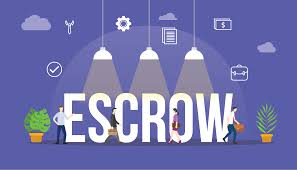If you’ve ever asked, “What is escrow, and why does everyone keep talking about it?”—you’re not alone.
For many homebuyers, the concept of escrow can feel unfamiliar or even intimidating. But understanding how it works is key to feeling confident during the home buying process. So let’s break it down.
What Is Escrow?
In simple terms, escrow is a secure financial arrangement where a neutral third party holds money or assets on behalf of two parties until certain conditions are met—like completing a home purchase.
Think of escrow as the “safety net” of a real estate deal. The funds are protected, the rules are clear, and everyone involved has peace of mind knowing the transaction is handled fairly.
How Escrow Works in a Home Purchase
Once your mortgage is approved and you’re heading toward closing, your lender will open an escrow account. This account holds your earnest money deposit (sometimes called a good faith deposit) and later helps manage other important payments.
Here’s what makes escrow so helpful:
- Security: Your money is protected. It only moves once all the agreement terms are met.
- Transparency: Every transaction is documented and visible, so there are no surprises.
- Convenience: After you close, your property taxes and insurance can be paid directly from the escrow account as part of your monthly mortgage payment.
Two Types of Escrow Accounts
Escrow actually plays two roles in the mortgage journey:
- Before Closing – Earnest Money
This shows the seller you’re serious about buying the home. While funds are held in escrow, things like home inspections and title searches take place. - After Closing – Taxes & Insurance (Impound Account)
Your lender continues to use the escrow account to pay your property taxes and homeowners insurance on time—so you don’t have to track those separately.
What Happens If There's an Escrow Shortage?
Each year, your lender reviews your escrow account to ensure it has enough to cover expected costs. If expenses (like taxes or insurance) rise unexpectedly, you may face an escrow shortage.
Here’s what can cause it:
- Property tax increases
- Insurance premium hikes
- Missed mortgage payments
- Changes in your insurance provider
If a shortage happens, you’ll typically have two options:
- Pay the difference in one lump sum
- Spread the shortage over your next 12 monthly payments
Can You Opt Out of Escrow?
Yes, in some cases—but not always. This is called an escrow waiver, and it allows you to manage your own tax and insurance payments.
To qualify, lenders typically require:
- A loan-to-value (LTV) ratio of 80% or less
- Strong credit (often 700+)
- A clean mortgage payment history
- Sufficient cash reserves
- Primary residence (not investment or second homes)
Note: FHA and USDA loans require escrow accounts. For VA and conventional loans, it depends on the lender’s criteria.
How Much Does Escrow Cost?
In 2025, escrow-related fees typically range from 1–2% of the home’s value, or about $2,000–$6,000 depending on your location and lender. These fees are usually split between buyer and seller, but that’s negotiable.
For post-closing escrow accounts (the ones that manage taxes and insurance), there’s usually no separate fee—it’s built into your monthly payment.
Common Questions About Escrow
Are my taxes paid through escrow?
Yes—if you have an impound account, your lender pays property taxes and insurance from that account on your behalf.
Can I remove insurance or taxes from escrow later?
Sometimes, yes—but you’ll need to request an escrow waiver and meet lender requirements.
Why do escrow shortages happen?
Usually because of increased taxes, higher insurance premiums, or initial cost underestimations.
Is escrow better than managing taxes and insurance yourself?
It depends. Escrow offers convenience and peace of mind. But if you prefer control and meet the qualifications, an escrow waiver might be right for you.
FAQ
What does escrow mean in a mortgage?
Escrow is a way to safely manage money and obligations during a home purchase or loan. It protects all parties involved by ensuring funds are released only when specific conditions are met.
Can escrow help with my insurance and taxes?
Yes. After closing, your escrow account can be used to pay these expenses on your behalf, bundled into your monthly mortgage payment.
Do I have to use escrow?
That depends on your lender, loan type, and financial profile. Some programs require it, while others may allow you to waive it.
What if I want to waive escrow?
You may be able to if you meet certain requirements, such as having strong credit, low LTV, and consistent payment history.
Is there a benefit to not using escrow?
For some homeowners, waiving escrow provides more financial control and flexibility—but it also means you’ll need to manage tax and insurance deadlines yourself.
Final Thoughts
Escrow might seem complex at first, but when explained clearly, it becomes a powerful tool for protecting everyone involved in a home transaction.
As your broker, I’m here to walk you through each step of the process. Whether you're wondering if you qualify for an escrow waiver or want help managing a shortage, let’s talk. I’ll make sure you feel informed and supported the whole way through.











